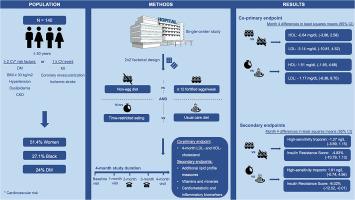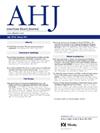强化鸡蛋和限时进食对心脏代谢健康的影响:PROSPERITY 试验。
IF 3.7
2区 医学
Q1 CARDIAC & CARDIOVASCULAR SYSTEMS
引用次数: 0
摘要
背景:鉴于人们对改善心血管健康的饮食干预越来越感兴趣,本试验评估了强化鸡蛋(FE)与非鸡蛋补充饮食、限时进食(TRE)与常规饮食对心血管生物标志物的影响:该研究采用非盲法、2乘2因子设计,将曾发生过心血管事件或具有两种心血管风险因素的患者随机分配到添加鸡蛋或不添加鸡蛋的饮食中,以及限时进食或常规饮食中。随机摄入 FE 的患者被要求每周至少摄入 12 FE(提供鸡蛋);摄入非鸡蛋补充饮食的患者则限制鸡蛋摄入量:共有 140 名患者接受了随机治疗,中位数(第 25 个百分位数,第 75 个百分位数)年龄为 66(58,73)岁;72(51%)名女性,38(27%)名黑人,33(24%)名糖尿病患者。高密度脂蛋白和低密度脂蛋白水平从基线到 4 个月的最小二乘法(LS)均值差异显示,FE 与非鸡蛋补充饮食(高密度脂蛋白:-0.64 mg/dL [95% CI:-3.86, 2.58];低密度脂蛋白:-3.14 mg/dL [-10.81, 4.52])和 TRE 与常规护理饮食(高密度脂蛋白:1.51 mg/dL [-1.65, 4.68];低密度脂蛋白 1.17 mg/dL [-6.36, 8.70])之间没有显著的临床差异。预先指定的亚组显示,在≥65 岁的患者中,高密度脂蛋白随 FE 的增加而增加,低密度脂蛋白随 FE 的减少而减少,但不显著:这些数据表明,与不补充鸡蛋的饮食和常规护理饮食相比,食用 FE 和 TRE 4 个月后低密度脂蛋白和高密度脂蛋白水平的变化没有临床相关性差异,提供了食用 FE 不会导致短期血脂和生物标志物发生不良变化的证据:试验注册:ClinicalTrials.gov Identifier:试验注册:ClinicalTrials.gov Identifier:NCT04673721。本文章由计算机程序翻译,如有差异,请以英文原文为准。

Effects of fortified eggs and time-restricted eating on cardiometabolic health: The prosperity trial
Background
Given the increasing interest in dietary interventions to improve cardiovascular health, this trial assessed the impact of fortified eggs (FE) versus nonegg supplemented diet and time-restricted eating (TRE) versus usual care diet on cardiovascular biomarkers.
Methods
The study was a unblinded, 2-by-2 factorial design, which randomized patients, with either a prior cardiovascular event or 2 cardiovascular risk factors, to FE or a nonegg supplemented diet and TRE or usual care diet. Patients randomized to FE were instructed to consume at least 12 FE/week (with eggs provided); those on a nonegg supplemented diet restricted egg consumption to <2 eggs/week. TRE participants were instructed to consume all calories within an 8-hour window daily and fasted for the remaining 16 hours. Patients randomized to usual diet were advised to maintain current dietary habits. Follow-up was performed in-person at 1 and 4 months, and telephone calls at 2 and 3 months. Co-primary endpoints were 4-month LDL- and HDL-cholesterol. Secondary endpoints included additional lipids, cardiometabolic- and inflammatory biomarkers and micronutrient levels at 4-months.
Results
Overall, 140 patients were randomized with median (25th, 75th percentiles) age 66 (58, 73) years; 72 (51%) women, 38 (27%) Black, and 33 (24%) with diabetes mellitus. The difference in least squares (LS) means from baseline to 4-months for HDL and LDL levels revealed no significant clinical difference between FE vs nonegg supplemented diet (HDL: -0.64 mg/dL [95% CI: -3.86, 2.58]; LDL: -3.14 mg/dL [-10.81, 4.52]) and TRE vs usual care diet (HDL: 1.51 mg/dL [-1.65, 4.68]; LDL 1.17 mg/dL [-6.36, 8.70]). Prespecified subgroups revealed a nonsignificant HDL increase and LDL decrease with FE in patients ≥65 years.
Conclusions
These data did not demonstrate clinically relevant differences in changes in LDL and HDL levels over 4 months with FE and TRE compared with nonegg supplemented diet and usual care diet, respectively, providing evidence that adverse short-term lipid and biomarker changes did not occur with FE consumption.
Trial Registration
ClinicalTrials.gov Identifier: NCT04673721.
求助全文
通过发布文献求助,成功后即可免费获取论文全文。
去求助
来源期刊

American heart journal
医学-心血管系统
CiteScore
8.20
自引率
2.10%
发文量
214
审稿时长
38 days
期刊介绍:
The American Heart Journal will consider for publication suitable articles on topics pertaining to the broad discipline of cardiovascular disease. Our goal is to provide the reader primary investigation, scholarly review, and opinion concerning the practice of cardiovascular medicine. We especially encourage submission of 3 types of reports that are not frequently seen in cardiovascular journals: negative clinical studies, reports on study designs, and studies involving the organization of medical care. The Journal does not accept individual case reports or original articles involving bench laboratory or animal research.
 求助内容:
求助内容: 应助结果提醒方式:
应助结果提醒方式:


